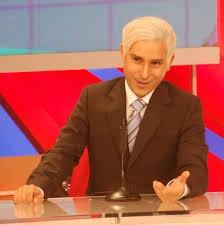BROOKE GLADSTONE: Enjoying the show so far? We’ll be the first to admit, it has not been exactly uplifting. It's been a violent, sad week. Sometimes the only way to wring anything positive out of it all is through the transformative power of comedy. In Israel, Eretz Nehederet, is a show of social and political satire, watched by 1 million of the country’s 8 million people. In this sketch, it skewers foreign policy clichés, by imagining them being taught to kids.
[KINDERGARTEN HOPE SKIT/CLIP]:
TEACHER: Do you want to play Who Are They to Preach Morals?
[CHILDREN CHEERING]
Okay, Italians.
CHILD: Helped the Nazis.
TEACHER: The French.
CHILD: The Vichy Regime.
TEACHER: And the Turks?
CHILD: Massacred the Armenians.
TEACHER: Incomplete answer.
CHILD: And the Kurds.
TEACHER: Norway?
CHILD: Killed all the salmon.
TEACHER: So what do we tell the world?
CHILDREN: Don’t preach us morals!
[END CLIP]
BROOKE GLADSTONE: Sharon Taicher writes for Eretz Nehederet. He says the staff doesn’t fret too much about balance.
SHARON TAICHER: I think we are quite balanced but being in Israel, when we have 8 million people over here, it’s 8 million opinions. Basically, we have to say something and we say it.
BROOKE GLADSTONE: Here, The Daily Show is funny but it actually informs a lot of people about the news. They get information and comedy and the backgrounds of the stories in the same package. Is that true with Eretz Nehederet?
SHARON TAICHER: The Israeli audience consumes hours of news during the day, so they really come to the screen with a wide common knowledge about what’s going on. So we are not telling the news. We explain the news.
BROOKE GLADSTONE: Can you give me an example of how you’ve done sketch comedy on violence, in the past?
SHARON TAICHER: Well, in the past military operations, we did a sketch in which military correspondents for the news were counting the deaths on both sides like it was a, a football game. It was a hard sketch, but it made a point.
BROOKE GLADSTONE: You often have actors or actresses playing Israeli officials. How do the actual officials feel about that?
SHARON TAICHER: Well, some of them might get offended. Some of them got offended after the show. But most of them realize that being on our show just made the public know them better.
BROOKE GLADSTONE: Bad publicity is better than no publicity?
SHARON TAICHER: In politicians, yes.
BROOKE GLADSTONE: Do you ever have conflicts within the staff sometimes about what to joke about? I mean, they say that comedy equals tragedy plus time. But, in your case, we’re talking about no time.
SHARON TAICHER: Well, we do sometimes argue about things in the writer’s room. Most of the time, if we feel that something might be too harsh, sometimes it’s a sign that we have to do it because we’re saying things about very important issues in the Israeli society. But most of the times we make people laugh, but sometimes we really get to change some views about issues, and that’s very fun work and a very important one, as well.
BROOKE GLADSTONE: Is there one that you can think of that you think actually did have that kind of impact?
SHARON TAICHER: Yes, it involves the army. I wouldn’t talk about it right now because of the irrelevance during wartime, but in the Israeli budget lots of money goes to the Israeli army. It looks like the most important thing about Israel is security and the army, like there’s nothing else important in Israel. And we made some sketches about where the money really goes. It made something.
BROOKE GLADSTONE: How do you know that it had an impact?
SHARON TAICHER: Well, nobody says that the Israelis don’t need an army but they look a bit deeper into the issue and the media did discuss it and started asking themselves questions like, should the Army really cost the amount of money it really takes from the budget?
BROOKE GLADSTONE: Sharon, thank you very much.
SHARON TAICHER: Thank you, Brooke.
BROOKE GLADSTONE: Sharon Taicher is a writer at Eretz Nehederet, the most popular sketch show in Israel.
[CLIP/MUSIC UP & UNDER]:
CHILD: I used to be a lefty, but I got disillusioned.
